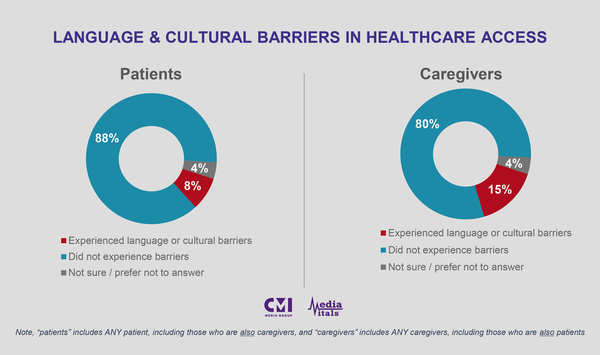
Pharma marketers should include healthcare equity in their
media campaigns, concludes a new research report from WPP healthcare agency CMI Media Group.
“By keeping diverse communities informed about new treatment options and guidelines,”
writes Khari Motayne, the agency’s vice president of engagement strategy, “organizations can address health disparities effectively,” helping to unlock $763 billion in business value
over the next 15 years.
The report, titled “2025 Focus on Health Equity,”
is based on CMI Media’s study of more than 4,500 consumers and 2,800 healthcare providers (HCPs) last March-April.
“Health equity is moving to the forefront of big pharma’s
agenda,” writes Danielle Koffer, the agency’s executive vice president and client business lead, and “serving these patients by providing them knowledge about life-saving drugs
is… the right thing to do… We cannot afford to ignore both this duty and this opportunity for our clients.”
advertisement
advertisement
“To effectively engage these audiences [Blacks and
Hispanics], it is crucial for pharmaceutical marketers to allocate dedicated budgets and development intentional strategies targeting them,” adds Egbavwe Pela, the agency’s group senior
vice president, engagement strategy.
Such a push seems to go counter to the prevailing winds in Washington, DC, where President Trump, for example, last week issued an executive order
terminating the Health Equity Advisory Committee at the Centers for Medicare and Medicaid Services.
“We’re holding off on commenting about politics at this time,” a CMI Media
Group spokesperson tells Marketing Daily. “Our intention with this report is to highlight the importance of inclusive and diverse media.”
Only 40% of the consumers said that
the gender, race and/or ethnicity of a healthcare provider does not factor into their decision on whom to engage, with 19% calling it a large factor. The race or ethnicity of the HCP being similar to
themselves was important to 41% of patients, followed by sexual orientation (40%), gender (36%) and age (33%).
Nearly half of patients said they are willing to travel between 30 and 90 minutes
to see HCPs who fit their own demographics, with this being particularly true among Blacks Patients also reported cancelling appointments due to barriers like cost and travel, particularly in
rural and urban areas.
“Customizing content to represent a variety of real-world healthcare interactions, as well as educating HCPs on best practices of supporting diverse patient
populations” can thus lead to “higher engagement and brand impact,” Sumita Ell, CMI Media’s associate director of audience intelligence, says in the report.
Backing
this up, the report cites Kanta MARS research conducted last May which showed that Black and Hispanic audiences demonstrate greater trust in advertising, and also tend to trust health information
websites, search engine findings, and pharma company drug websites. They’re also more likely than others to take action after viewing healthcare ads – and “to take their medications,
follow treatment plans and engage in preventative behavior,” as noted by Hemali Lakhani, CMI Media’s senior vice president, engagement strategy.